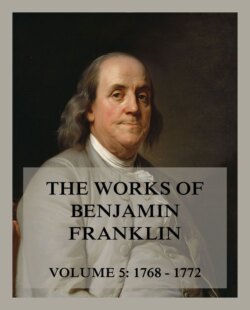Читать книгу The Works of Benjamin Franklin, Volume 5 - Бенджамин Франклин - Страница 26
На сайте Литреса книга снята с продажи.
CCCLVI: POSITIONS TO BE EXAMINED, CONCERNING NATIONAL WEALTH
Оглавлениеdated april 4, 1769.
1. All food or subsistence for mankind arises from the earth or waters.
2. Necessaries of life, that are not food, and all other conveniences, have their values estimated by the proportion of food consumed while we are employed in procuring them.
3. A small people, with a large territory, may subsist on the productions of nature, with no other labor than that of gathering the vegetables and catching the animals.
4. A large people, with a small territory, find these insufficient, and, to subsist, must labor the earth, to make it produce greater quantities of vegetable food, suitable for the nourishment of men, and of the animals they intend to eat.
5. From this labor arises a great increase of vegetable and animal food, and of materials for clothing, as flax, wool, silk, &c. The superfluity of these is wealth. With this wealth we paid for the labor employed in building our houses, cities, &c., which are therefore only subsistence metamorphosed.
6. Manufactures are only another shape into which so much provisions and subsistence are turned, as were equal in value to the manufactures produced. This appears from hence, that the manufacturer does not, in fact, obtain from the employer, for his labor, more than a mere subsistence, including raiment, fuel, and shelter; all which derive their value from the provisions consumed in procuring them.
7. The produce of the earth, thus converted into manufactures, may be more easily carried to distant markets than before such conversion.
8. Fair commerce is, where equal values are exchanged for equal, the expense of transport included. Thus, if it costs A in England as much labor and charge to raise a bushel of wheat, as it costs B in France to produce four gallons of wine, then are four gallons of wine the fair exchange for a bushel of wheat, A and B meeting at half distance with their commodities to make the exchange. The advantage of this fair commerce is, that each party increases the number of his enjoyments, having, instead of wheat alone, or wine alone, the use of both wheat and wine.
9. Where the labor and expense of producing both commodities are known to both parties, bargains will generally be fair and equal. Where they are known to one party only, bargains will often be unequal, knowledge taking its advantage of ignorance.
10. Thus, he that carries one thousand bushels of wheat abroad to sell, may not probably obtain so great a profit thereon as if he had first turned the wheat into manufactures, by subsisting therewith the workmen while producing those manufactures; since there are many expediting and facilitating methods of working not generally known; and strangers to the manufactures, though they know pretty well the expense of raising wheat, are unacquainted with those short methods of working, and thence being apt to suppose more labor employed in the manufactures than there really is, are more easily imposed on in their value, and induced to allow more for them than they are honestly worth. Ref. 026
11. Thus the advantage of having manufactures in a country does not consist, as is commonly supposed, in their highly advancing the value of rough materials, of which they are formed; since, though six pennyworth of flax may be worth twenty shillings when worked into lace, yet the very cause of its being worth twenty shillings is, that, besides the flax, it has cost nineteen shillings and sixpence in subsistence to the manufacturer. But the advantage of manufactures is, that under their shape provisions may be more easily carried to a foreign market; and, by their means, our traders may more easily cheat strangers. Ref. 027 Few, where it is not made, are judges of the value of lace. The importer may demand forty, and perhaps get thirty, shillings for that which cost him but twenty.
12. Finally, there seem to be but three ways for a nation to acquire wealth. The first is by war, as the Romans did, in plundering their conquered neighbours. This is robbery. The second by commerce, which is generally cheating. The third by agriculture, the only honest way, wherein man receives a real increase of the seed thrown into the ground, in a kind of continual miracle, wrought by the hand of God in his favor, as a reward for his innocent life and his virtuous industry.
